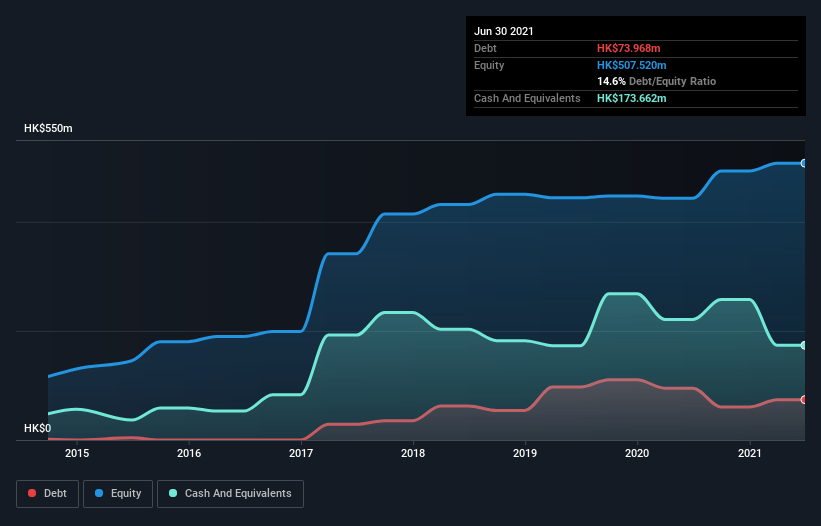- Hong Kong
- /
- Professional Services
- /
- SEHK:1486
C Cheng Holdings (HKG:1486) Has Debt But No Earnings; Should You Worry?
David Iben put it well when he said, 'Volatility is not a risk we care about. What we care about is avoiding the permanent loss of capital.' So it might be obvious that you need to consider debt, when you think about how risky any given stock is, because too much debt can sink a company. Importantly, C Cheng Holdings Limited (HKG:1486) does carry debt. But is this debt a concern to shareholders?
Why Does Debt Bring Risk?
Debt and other liabilities become risky for a business when it cannot easily fulfill those obligations, either with free cash flow or by raising capital at an attractive price. If things get really bad, the lenders can take control of the business. However, a more common (but still painful) scenario is that it has to raise new equity capital at a low price, thus permanently diluting shareholders. Of course, plenty of companies use debt to fund growth, without any negative consequences. The first step when considering a company's debt levels is to consider its cash and debt together.
See our latest analysis for C Cheng Holdings
What Is C Cheng Holdings's Net Debt?
As you can see below, C Cheng Holdings had HK$74.0m of debt at June 2021, down from HK$95.0m a year prior. But it also has HK$173.7m in cash to offset that, meaning it has HK$99.7m net cash.

How Healthy Is C Cheng Holdings' Balance Sheet?
Zooming in on the latest balance sheet data, we can see that C Cheng Holdings had liabilities of HK$277.0m due within 12 months and liabilities of HK$85.4m due beyond that. Offsetting this, it had HK$173.7m in cash and HK$460.2m in receivables that were due within 12 months. So it actually has HK$271.4m more liquid assets than total liabilities.
This surplus strongly suggests that C Cheng Holdings has a rock-solid balance sheet (and the debt is of no concern whatsoever). Having regard to this fact, we think its balance sheet is as strong as an ox. Succinctly put, C Cheng Holdings boasts net cash, so it's fair to say it does not have a heavy debt load! When analysing debt levels, the balance sheet is the obvious place to start. But it is C Cheng Holdings's earnings that will influence how the balance sheet holds up in the future. So if you're keen to discover more about its earnings, it might be worth checking out this graph of its long term earnings trend.
Over 12 months, C Cheng Holdings reported revenue of HK$831m, which is a gain of 23%, although it did not report any earnings before interest and tax. Shareholders probably have their fingers crossed that it can grow its way to profits.
So How Risky Is C Cheng Holdings?
Although C Cheng Holdings had an earnings before interest and tax (EBIT) loss over the last twelve months, it made a statutory profit of HK$15m. So taking that on face value, and considering the cash, we don't think its very risky in the near term. Given it also grew revenue by 23% over the last year, we think there's a good chance the company is on track. So this may well be an interesting business to watch grow. The balance sheet is clearly the area to focus on when you are analysing debt. However, not all investment risk resides within the balance sheet - far from it. Case in point: We've spotted 2 warning signs for C Cheng Holdings you should be aware of, and 1 of them shouldn't be ignored.
At the end of the day, it's often better to focus on companies that are free from net debt. You can access our special list of such companies (all with a track record of profit growth). It's free.
When trading stocks or any other investment, use the platform considered by many to be the Professional's Gateway to the Worlds Market, Interactive Brokers. You get the lowest-cost* trading on stocks, options, futures, forex, bonds and funds worldwide from a single integrated account. Promoted
New: AI Stock Screener & Alerts
Our new AI Stock Screener scans the market every day to uncover opportunities.
• Dividend Powerhouses (3%+ Yield)
• Undervalued Small Caps with Insider Buying
• High growth Tech and AI Companies
Or build your own from over 50 metrics.
This article by Simply Wall St is general in nature. We provide commentary based on historical data and analyst forecasts only using an unbiased methodology and our articles are not intended to be financial advice. It does not constitute a recommendation to buy or sell any stock, and does not take account of your objectives, or your financial situation. We aim to bring you long-term focused analysis driven by fundamental data. Note that our analysis may not factor in the latest price-sensitive company announcements or qualitative material. Simply Wall St has no position in any stocks mentioned.
*Interactive Brokers Rated Lowest Cost Broker by StockBrokers.com Annual Online Review 2020
Have feedback on this article? Concerned about the content? Get in touch with us directly. Alternatively, email editorial-team (at) simplywallst.com.
About SEHK:1486
C Cheng Holdings
An investment holding company, provides architectural services in Mainland China, Hong Kong, the Middle East and North Africa, Macau, and internationally.
Excellent balance sheet and good value.
Market Insights
Community Narratives



